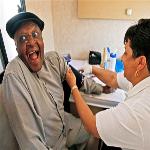A new study says men in sub-Saharan Africa are not accessing HIV/AIDS treatment nearly as often as women. That means many are dying prematurely. Researchers are calling for a more balanced approach to gender in fighting the epidemic.
Edward Mills has spent many years in Africa supervising HIV/AIDS treatment programs. He said it became obvious who was receiving antiretroviral drugs and who wasn't.
"Whenever you walk into a busy clinic, it's almost exclusively women and children. And there might be one or two men there, who appear to be reluctant to be there. They're frequently brought by their wives. And I had wondered, well, where are all the men? Maybe they're accessing a men's only clinic or something like that. And after several years of observing this, I came around to discussing this with my colleagues and they say, no, no, this is it. These are the men who show up. And they're frequently only the ones who are brought by their wives," he said.
Where and why?
Mills is an associate professor and Canada Research Chair of Health Sciences at the University of Ottawa.
"Where are all of the men? And nobody seemed to know what the answer was. If all of these women are infected with HIV, surely there are men that are infected as well. Then I was able to look into testing centers, which is where people go and get tested. It's frequently a different place than where they go and get treatment. There are a lot of men at the testing centers, but yet, you don't see them at the clinics for antiretroviral care. And so somewhere in between the time of testing and the time of accessing clinical care we're missing out on these men," he said.
So, having learned where the men were, the next question Mills faced was why didn't they go for life saving treatment?
He said, "There's a lot of stigma about men having done something wrong. So, if a man has been found to be HIV positive, chances are he's done something he shouldn't have been doing. So, it's either that you have a Christian country like Uganda, for example, where they shouldn't have been having pre-marital sex, or they've been visiting sexworkers, or they've been having a relationship outside of their marriage. So, a variety of things that create stigma."
Mills said that the men are often very shamed that they are HIV positive and afraid of what their wives will say. While many men do not go to HIV clinics, they do seek treatment. It's just that the treatment they use won't work.
"Men initially try to treat the HIV themselves. This is what we believe to be the case. And so they maybe go to pharmacies and they buy some aspirin or some Tylenol and they don't want to accept that they they've got HIV. And so we're doing a very bad job of educating men about HIV (being) a chronic disease that you're going to die from if you don't access care at the right time. And you can't treat it yourself. Traditional medicines aren't going to work, nor is buying cheap medicines at a pharmacy going to work," he said.
Raising awareness
Mills said a new approach is needed to encourage African men to get treatment for HIV. He says possibly a major campaign by UNAIDS may be needed to jump start efforts.
"It's possible that with the increase in male circumcision that's going on that's happening for young males, in their adolescents or early 20s, that that could be an opportunity to test them and counsel them and try to engage them in care. But to be honest I think we need to take this at a much larger scale; and we need to start implementing public health campaigns that are aimed at targeting men's behavior around accessing health care," he said.
Current HIV/AIDS campaigns for men are different than those for women.
"So, if you're in Africa at the moment you will see public health campaigns aimed at men telling them to reduce the number of sexual partners that they've got. But it's all about stopping certain activities. It's not about implementing access to health care. And that's probably where we need to go because you do see that for females a lot of the time. They'll have campaigns on the roadside with big posters up saying if you're pregnant to make sure you get an HIV test so you save your baby," he said.
On the other hand, Mills said women should also receive the behavior change message. He cites HIV figures for discordant couples. These are couples where one person is HIV positive and the other is not.
"If we believe the way that the gender story has been told to us all these years, then in any discordant relationship you would expect the person who is HIV positive to be the male. But when you look at the evidence, actually about 50 percent of the time it's the male and 50 percent of the time it's the female. So, there are several different interpretations of this, but the best one is it appears that both genders go outside of their marriage," he said.
He said women, whether African or not, often do better with health care because they are more in tune with their bodies. Also, women frequently learn of their HIV status while receiving care during pregnancy. Mills says when men access health care they are often in the late stage of disease.
Professor Mills has worked in Africa for 10 years, mostly in South Africa, Uganda and Rwanda.
